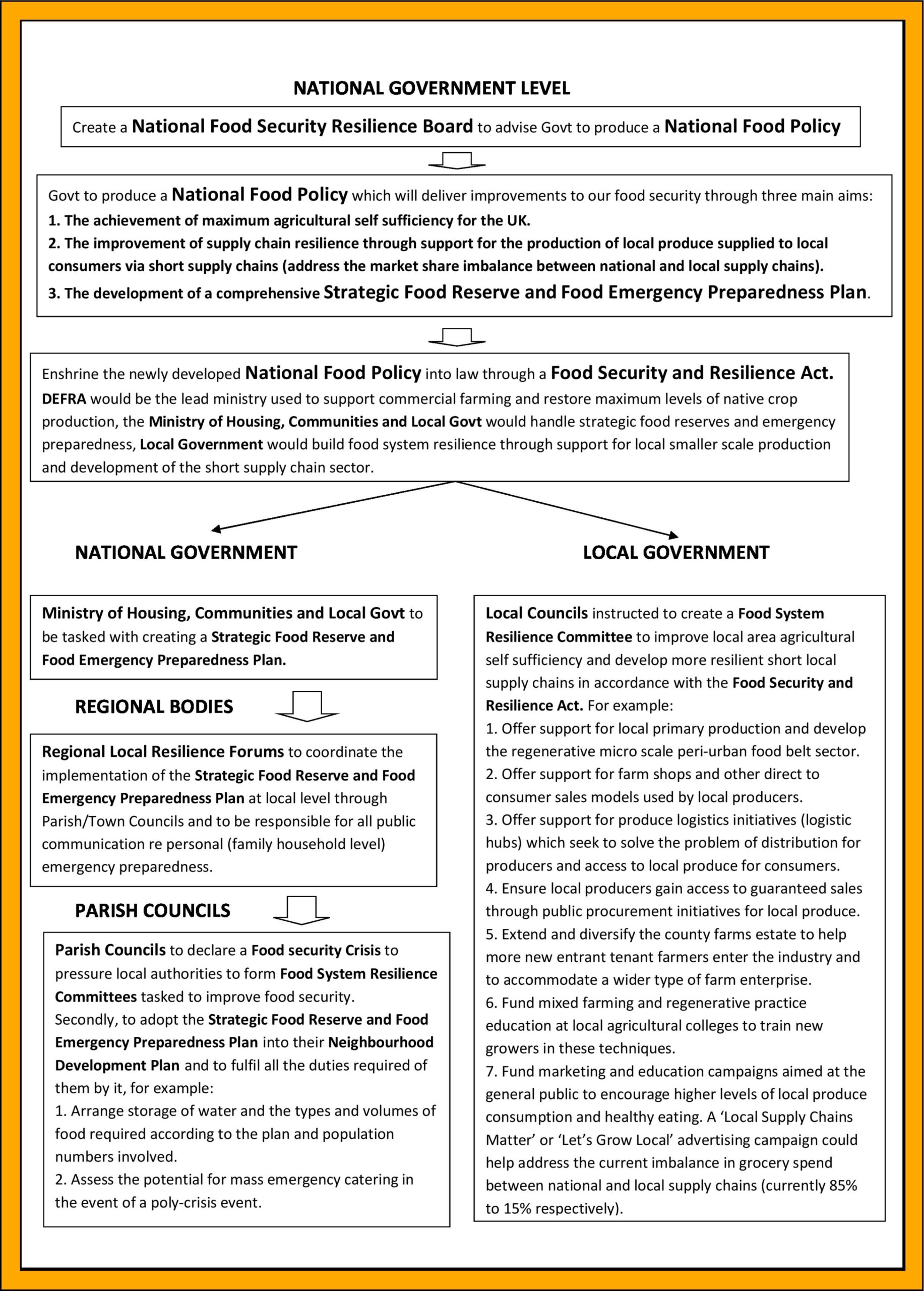Introduction to the Food Security Policy Flowchart
Key issues covered by the flowchart.
The policy flowchart below brings together a summary of the recommendations made to the UK Preparedness Commission by Professor Tim Lang in his report on food security with the Farmers Movement Cornwall campaign to request Cornwall Council declare a food security crisis and create a food system resilience committee to combat our falling level of our food security.
Here is a link to the report by Professor Tim Lang:
The report covers many of the key issues that need to be addressed such as the transition of our current ‘just in time’ fragile supply chain to a more resilient one built with ‘just in case’ in mind. It also covers the need for strategic food reserves and emergency preparedness, something that is sadly lacking in relation to food security within our current policy framework.
Recognition of current supply chain disparity.
The key concept of two distinct supply chains operating in the UK is important to understand as is the disparity at present between the size (and market share of spend per capita on fresh produce) of the long and more inherently risky one which services our national supermarket infrastructure when compared to the short and more resilient local equivalent. The UK consumer currently spends 80 to 85% of their fresh produce budget in large national supermarkets compared to just 15 to 20% in local farm shops or other direct to retail outlets operated by local companies or producers.
Our analysis of the report in context to our vision of an agrarian restoration.
The report is excellent but in our opinion an issue that could have received more emphasis is the need for farming to perceive a new future for itself. Whilst the contribution to keeping food affordable made by large growers operating at the biggest economies of scale is noted, consideration to diversification into different production and sales models for medium and small scale operators must be given, likewise, development of the peri urban regenerative micro scale sector requires urgent attention. A return to large farming families using mixed production closed input loop systems together combined with a direct to consumer sales model is one obvious example as is the will for growers to collectivise and form distribution logistics and marketing/sales cooperatives. Of course this is trans-generational long term thinking but it nevertheless needs to be done to hopefully at some point steer the sector away from the hands of monopoly power within the supply chain and away from increasing levels of politically coercive state dependency.
From the perspective of the consumer.
Consumer mindset and spending habits also need to change and we must accept the reality that good food costs more, in fact we need to realise that the cheap food policy forced upon this country by the globalist minded political establishment has caused a lot of indirect harm to the environment and to our self reliance and indeed to our health through the import of foods grown to lower standards and through the promotion of processed foods designed for convenience and an extended shelf life. Asking people to recognise the holistic value of and to pay more for locally produced fresh produce will be a hard sell for many in this current high taxation, high public spending, corrupted political environment but anyone who can afford it must do their best to be the change we want to see as whether you are in a position of local authority or not, you must now do your bit to pull us all up by our bootstraps as one thing is for certain, those currently in power will not be coming to our rescue any time soon.
A first step in holding power accountable.
Our initiative for parish and town councils and for members of the public resident within Cornwall to declare a food security crisis is the first step in a grassroots action aimed at holding local government accountable to the duty of care they hold in the assurance of continued food security for the communities they serve.
This measure, if successful and if followed by the creation of a food system resilience committee within Cornwall Council, can be used to arrest the decline in British farming and agricultural self sufficiency until such time as a Food Security Resilience Act can be passed into law by central government, or the government can be replaced by one which is willing to bring it forth. Either way, in the short term it is being left to concerned members of the public and to serving members of local authorities to campaign and act in the defence of our communities and we very much hope you will support our cause.
Regards
Peter Lawrence
Farmers Movement Cornwall

